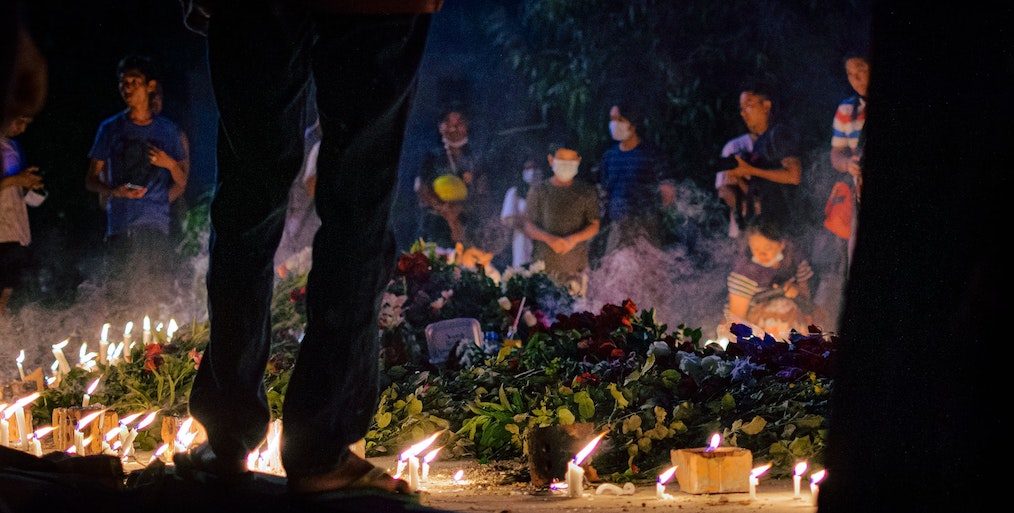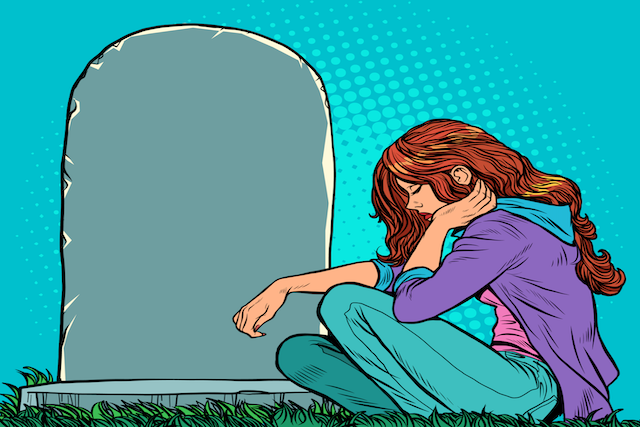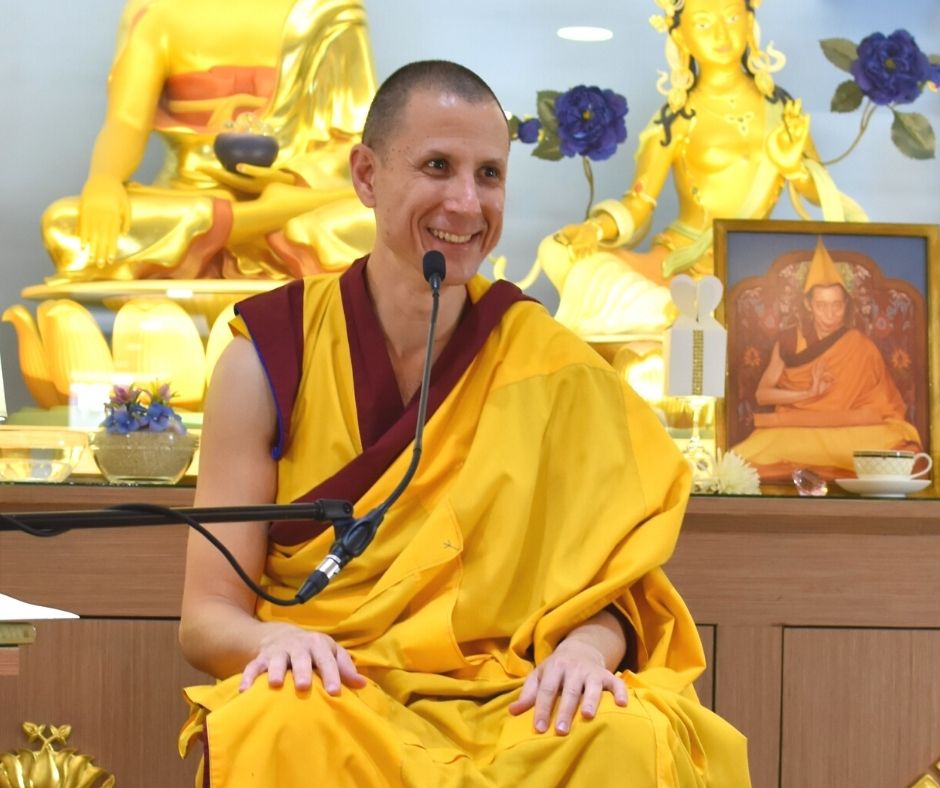Two Years after the Coup
What can be done to address the ongoing crisis and suffering in Myanmar? The post Two Years after the Coup appeared first on Tricycle: The Buddhist Review.

For decades, Myanmar, also known as Burma, was a refuge and resource for those seeking the Buddha’s teachings, including many of the most prominent and influential Western teachers of the mindfulness movement. Even beyond teachers of mindfulness, though, the effects of Burmese mindfulness teachings have been felt throughout the entire Western Buddhist world, in every tradition, and beyond the Buddhist world as well. Given this debt of gratitude and these threads of interconnection, how should we respond to events in Myanmar now? Although the country has long suffered from severe poverty, ethnic divisions that are a lingering result of colonialism, and the fascist rule of generals, events in recent years have been nothing short of a descent into horror.
Watching now, one can only say, “cry the beloved country.” In February 2021, the military seized power in Myanmar, returning it to dictatorial rule by the junta, who have held power off and on since 1962. The modest progress toward democracy that had been made with the election, and subsequent parliamentary leadership, of the National League for Democracy (NLD) in 2015 collapsed, sparking nationwide protests. Journalists and activists were jailed and often sentenced to hard labor. Civil unrest was crushed with violent countermeasures, including the assault, imprisonment, and murder of protesters by the junta. The numbers are staggering: 2,519 people have been killed and 16,275 people arrested, and until recently, 12,962 were still detained by the military, according to the Assistance Association for Political Prisoners. In recent weeks, 6,000 prisoners were granted amnesty and released, including some political prisoners like writer Maung Thar Cho, who is known for his satirical pieces criticizing the Myanmar military before the coup, and Shwe Nyawa Sayadaw, an antiregime Buddhist monk. This is surely cold comfort to those opposing the regime given the immediate rearrest of Saw Phoe Kwar, a Karen peace activist and singer, after his release last week.
Fighting between the Myanmar junta and resistance groups, including the People’s Defense Force (PDF), rages on, with the PDF claiming the deaths of 45 junta members recently. On the other side, the junta have been guilty of many attacks on civilians as well as fighters. The popular Burmese singer Aurali Lahpai was performing onstage in northern Myanmar in October when three military jets flew overhead and bombed the outdoor concert. One bomb struck near the main stage, killing Lahpai and several others in the middle of a song. At least eighty were killed in the attack, according to emergency workers. In two separate attacks in recent months, children’s schools were brutally targeted by the junta, resulting in the deaths of several children, in one case as a result of gunfire from helicopter-mounted guns.
The members of the National League for Democracy (NLD), the party of Aung San Suu Kyi, have largely been disempowered or jailed, including the onetime symbol of democratic rule herself, who was sentenced to a total of twenty-six years in prison on corruption charges, even for the supposed crime of having faked her own democratic election.
The Bamar Buddhist majority in Myanmar, finding themselves again in the barrels of the government supposedly sworn to protect them, has been faced with the reality that the military junta is neither interested in Bamar identity nor Buddhism, but only in power. The junta, in recent years, has wielded specious claims to be defending Buddhism as a justification for disempowering Myanmar’s non-Buddhist tribal minorities. In some cases, members of the Buddhist sangha have been complicit, or even openly supportive, in these claims.
Khin Mai Aung, a Burmese writer and lawyer in New York City, is one of many Burmese around the world who would like to see an end to ethnic division and fascist rule in the country. Aung says the feeling among Burmese is now growing that the mask has slipped, revealing that they are not motivated by even a perverse interpretation of Buddhism, but are simply cynical through and through. “The murder of Buddhist protesters, and even children, has made it clear in the eyes of many that their true enemy is anyone not themselves. Both Bamar Buddhists and non-Bamar, non-Buddhist minorities are engaged in resisting the government. I wouldn’t be overly optimistic about this given the history of ethnic divisions in Burma, but it does hold out a glimmer of hope.”
What has become of the Rohingya, victims of a military offensive that sent hundreds of thousands of them across the border into Bangladesh and that many have called outright genocide? The situation in Rakhine has deteriorated, with rising tension between the Myanmar military and the Arakan Army, another armed group fighting for self-determination for ethnic minorities in the state, which has left the Rohingya caught between the two. Last November, there were reports of mass arrests of Rohingya who had tried to leave Rakhine, with the military handing out more severe sentences against those convicted. Meanwhile, the successful campaign by the junta to enlist the Bamar Buddhist majority against the Rohingya Muslims has alienated many in the West.
What Can We Do?
“On one, obvious level,” says Maung Zarni, a Burmese dissident in exile who is now a UK-based human rights activist and a founding architect of the Free Rohingya Coalition, “one can support humanitarian efforts to bring aid to the Rohingya and others impacted by the violence of the regime.” To that end, we can note, Buddhist Global Relief is collecting donations, as well as recommending people give to the Buddhist Humanitarian Project, which was recently formed with the express purpose of giving aid to the Rohingya. “This is important and necessary,” continues Zarni. “On another level, one can support pro-democratic, pro-peace elements in Burma and abroad.”
Joah McGee, a longtime popular podcaster on religion, culture, and politics in Burma/Myanmar, says “Myanmar is a place of contradictions, yet people sometimes see it in black-and-white terms. The monks are good or the monks are bad; the people are devout Buddhists living in enviable simplicity or they are ignorant racist peasants who don’t understand real Buddhism. The reality is more complicated.”
In addition to working to advance accurate information about Myanmar into the global conversation, McGee is the founder of Better Burma, which provides humanitarian aid and “supports the Burmese people in their struggle for freedom.”
McGee says that the junta exercises strict control over the flow of all goods in Myanmar and actively prevents humanitarian aid of any kind. “We have had to find ways to connect to clandestine local networks which deliver food, medicine, and other aid. Burmese people trying to deliver rice or medicine have to put spotters on the roads and try to evade the junta.”
Hozan Alan Senauke, who oversees the network of engaged Buddhists called the Clear View Project, points to the importance of peacebuilding, the support of civil society, and training for democracy. Senauke says that the time for Western organizers acting as leaders in Myanmar has passed, but there are now local, indigenous movements that are doing excellent work, like the Spirit in Education Movement of Sulak Sivaraksa.
Yet, Zarni notes, focusing on the situation inside Myanmar is not enough. “The crisis in Burma is not merely a local crisis,” he says. “China is involved, Russia is involved, and other governments like the UK, America, and Israel are involved because they are complicit, or because they have business interests in Burma, or are selling them arms, or because they don’t want to risk conflict with China, who supports the regime. We shouldn’t forget that Rakhine state, where the Rohingya have been driven out of, is on valuable coastal property which local and international actors are interested in for monetary reasons.”
As Zarni points out, the Burmese crisis is finally a global crisis. As long as governments around the world fail to cooperate in the spread of true democracy, and as long as wealth inequality and dirty resource extraction rule the day, it will be very difficult to bring healing to Burma and other countries in the throes of poverty and fascism.
Myanmar’s crisis is not an isolated one; it is interdependent with the global political ecology. As with so many of the crises we face, solving them will require nothing short of the bodhisattva activity of healing the world. Our activities for Burma, then, shouldn’t be limited to sending money to refugees—as vital as that is—but should also include taking whatever opportunities we can to strengthen democracy, build wealth equality, and encourage responsible energy practices both at home and around the world. This may seem a daunting task, but as the Zen bodhisattva vow—“beings are numberless, I vow to save them all”—teaches us, the impossibility of a task is no reason not to do it.

 Hollif
Hollif 
































